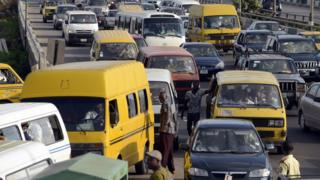Can Nigeria clean up its dirty air?
 Image copyright AFP
Image copyright AFPStand anywhere in Lagos and you can see the thunderous traffic, which gives this city an energy and intensity quite unlike any other.
Nigerians call the gargantuan traffic jams of cars, trucks, buses and vans "go-slows". Trying to get anywhere is often an exercise in patience and perseverance.
But apart from the frustrations of driving here there is the serious health impact of air pollution.
Many vehicles belch out huge dark sulphurous clouds of exhaust emissions - the effects of "dirty fuels".
For the hawkers weaving and bobbing through the traffic selling an assortment of drinks and snacks, it is a toxic environmental to work in.
"Sometimes I feel sick. I don't know what causes it - maybe the fumes or the dust," said one hawker who was selling tissues.
"I have a little cough now. It's disturbing me but I don't think it's serious."
But some relief for the hawker and many others left wheezing in Lagos is at hand.
In a move described as a huge breakthrough by environmental campaigners, Nigeria is now tackling one of its major causes of air pollution.
Last December, Nigeria was among five countries in West Africa that pledged to stop importing dirty fuel used for vehicles but also to power generators.
The announcement followed a hard-hitting report accusing European companies of exploiting weak regulations in West Africa to export fuels with high levels of sulphur.
The World Health Organisation ranks sulphur particles from vehicle engines and generators as one of the top global risks - it is linked to heart disease, lung cancer and respiratory problems.
For decades, Nigeria relied on colonial-era standards, which campaigners say were woefully inadequate for today's needs.
It meant that retailers could export fuel to Nigeria that had 300 times the amount of sulphur of that which was legally allowed to be sold in Europe.
Now "dirty fuels" will be banned in July when the government starts enforcing tough new regulations - roughly in line with European standards.
The government is currently giving importers a six-month grace period to comply with the new regulations.
"The ban will send a strong signal to the importers that the government means business," says David Ugolor, Executive Director of Africa Network for Environment and Economic Justice.
"What's missing in Nigeria governance is trust. If the government wants to regain trust of the people it will need to keep on championing this kind of regulation."
Despite being a major oil producer, Nigeria imports most of its fuel.
But the government says that new refineries being built in Nigeria will also help alleviate the problem by producing cleaner fuel.
Dr Olatomi Bamigboje, pediatrician and respiratory specialist:
"Unless we tackle pollution, we're looking at an epidemic of respiratory problems, an epidemic of cardiovascular problems and an epidemic of chronic lung diseases."
In pictures: Nigeria's 'city of soot'
Health experts welcome the move but say even with the ban a lot more needs to be done to avert a crisis.
"Urbanisation, industrialisation - all this contributes to air pollution," says Dr Olatomi Bamigboje, a pediatrician and respiratory specialist. "As the pollution gets worse, the likelihood is more people will get sick."
In the last decade she's seen a doubling of the number of children suffering from asthma.
"Unless we tackle pollution, we're looking at an epidemic of respiratory problems, an epidemic of cardiovascular problems and an epidemic of chronic lung diseases, which we may not be able to handle with the present health system we have.
The big attraction of "dirty fuels" is they are cheap and the new regulations are likely to mean a hike in prices at the pumps.
But if this ban is successful it will go a long to cleaning up Nigeria's air - and that will save a lot more than money.

